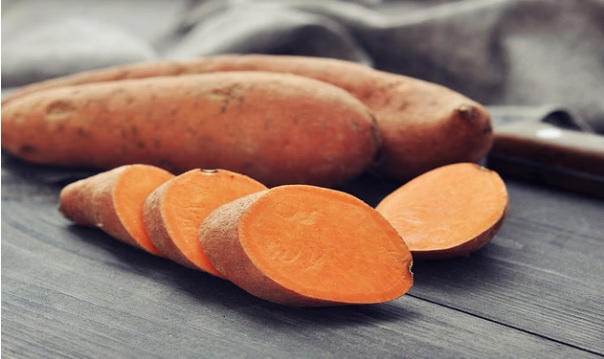
The benefits of sweet potatoes
With its warm color, nutritional properties and delicious texture, the sweet potato can be eaten without moderation.
Introducing the sweet potato.
The sweet potato is a starchy vegetable of the Convolvulaceae family. It generally replaces the potato. However, it does not belong to the same family as the potato. It is eaten for its delicious tubers.
What are its characteristics?
Depending on the variety, the skin is brown or purple. Flesh can be orange, white or violet.
- Family: Convolvulaceae ;
- Season : October to March ;
- Origin: South America;
- Color: white, yellow, orange or purple;
- Taste: sweet
Where does it come from?
It’s a tuber native to South America. There, it is called “batata” or “comate”. It is available all year round. And it’s grown in tropical and subtropical regions such as Central America, the Philippines and Peru.
Its nutritional values
- .Rich in vitamins A, B2, B5, B6 and C.
- It has 10 times more vitamin A than potatoes.
- Rich in copper and manganese
- Rich in complex carbohydrates
- Rich in starch
- Rich in fiber. It has more than 50% more fiber than potatoes.
- A concentrate of antioxidants with a moderate glycemic load.
What are the health benefits of sweet potatoes?
1/ Excellent for the skin.
Like carrots, sweet potatoes are very good for skin care, as they are rich in beta-carotene.
2/ A powerful antioxidant
Rich in vitamins A and C, this delicious starch is a powerful antioxidant for eliminating the free radicals that damage the body’s cells.

3/ .Ideal during pregnancy and for babies.
With its high vitamin A content, it is highly nutritious for mothers and babies.
4/ Reduces the risk of cancer
Studies have shown that eating sweet potatoes reduces the risk of cancer (prostate, gallbladder…). Research from an epidemiological study indicates that people who eat a typical “South American” diet, i.e. sweet potatoes, dried beans, okra and rice, are less likely to develop prostate cancer. As for sweet potato leaves, they could offer protection against lung cancer.
5/ Support for memory.
Regular consumption of this vegetable can help reduce memory problems. In fact, certain pigments contained in sweet potatoes help combat age-related degenerative disorders.
6/ Boosts the immune system
Sweet potatoes are very good for the body and the immune system, thanks to their polysaccharide content.
7/ Preventing bad cholesterol.
The phytonic compounds in sweet potatoes could prevent the oxidation of bad cholesterol (LDL), thereby reducing the risk of cardiovascular disease.
8/ Good for diabetics.
People with diabetes can consume sweet potatoes, as they help stabilize blood sugar levels. One study found that drinking a purple sweet potato drink improved liver function in men at risk of diabetic hepatitis.
9/ Protective effect on the liver
Animal studies have shown that sweet potatoes have a protective effect on the liver. It is believed to reduce liver enzymes, which are responsible for lesions and diseases such as hepatitis.
How do you eat it?
Sweet potatoes can be eaten at any time and in a thousand and one ways. It can be eaten raw, fried, mashed, au gratin, crisped or baked. In fact, they can be boiled, pan-fried, baked or fried for both sweet and savory dishes.
Most of the time, sweet potatoes are used to accompany meat and fish dishes. The leaves are cooked in the same way as spinach.

How to choose it?
If you go to the market, we advise you to choose a sweet potato that is spotless and heavy in the hand.
How do you keep it?
Store in the fridge or in a cool, dry, dark place for a maximum of 7 to 10 days.
Who can eat it? Prevention.
In general, anyone can eat this starch, except those prone to kidney stones, who should take it in moderation, as it contains a significant amount of calcium oxalate.
Do sweet potatoes make you fat?
No, it doesn’t make you fat, and the answer is no. Sweet potatoes help you control your weight. It makes you feel full, which reduces the risk of snacking.
|
|
Qu’en pensez-vous ?
























